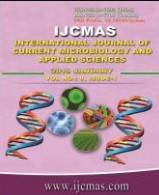


 National Academy of Agricultural Sciences (NAAS)
National Academy of Agricultural Sciences (NAAS)

|
PRINT ISSN : 2319-7692
Online ISSN : 2319-7706 Issues : 12 per year Publisher : Excellent Publishers Email : editorijcmas@gmail.com / submit@ijcmas.com Editor-in-chief: Dr.M.Prakash Index Copernicus ICV 2018: 95.39 NAAS RATING 2020: 5.38 |
Community-acquired bloodstream infections are the infections detected within 48 hours of hospitalization, showing positive blood culture and develop spontaneously without an association with any prior medical interventions. Aims of the study are to identify the clinical profile of patients, detect the pathogens causing community-acquired bloodstream infections (CA-BSI) and their antimicrobial susceptibility pattern and to perform the molecular characterization of resistant pathogens. Under strict aseptic precautions, blood samples were collected and processed as per standard protocol and isolates identified. Their antimicrobial susceptibility testing was performed by Kirby-Bauer disk diffusion method under CLSI guidelines. Vancomycin sensitivity tested using Vancomycin Screen agar and confirmed by E-strip test. Resistant strains were characterized by PCR. Blood culture in 150 patients, detected 12 patients (8%) with CA-BSI. Gram-positive organisms 58% (MSSA 85.7% and 14.3% MRSA) isolated, were highly sensitive to Erythromycin, Vancomycin, Linezolid and 42% Gram-negative organisms (Escherichia coli 60% which were ESBL producers, 20% Acinetobacter baumannii and 20% Pseudomonas aeruginosa) isolated, were highly sensitive to Amikacin, Tetracycline each 100% respectively. bla TEM and bla CTX-M genes among ESBL producers and mecA gene in MRSA isolate were positive by PCR. CA-BSI are rising as a major health problem in the upcoming years due to the emergence of antimicrobial resistant strains in the community as well, like ESBL producers, MRSA, etc. Hence, proper surveillance, the framing of appropriate antibiotic policy and preventive strategies curtails the spread of these resistant strains in the community.
 |
 |
 |
 |
 |